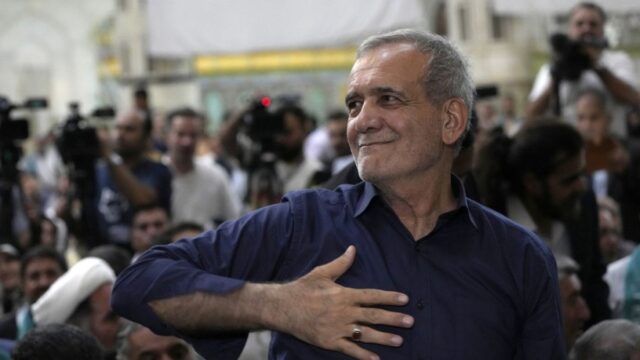Despite the pressure of years of Western sanctions and internal protests in Iran, the EU should not expect many changes in the dialogue with Masoud Pezeshkian, says an analyst interviewed by Euronews. The reformist candidate won the presidential elections against the tough Saeed Jalili.
Masoud Pezeshkian promises to encourage dialogue with Western powers, but does not want radical changes in the Shiite theocracy ruled by the supreme leader, the Ayatollah Ali Khamenei.To demonstrate this, the heart surgeon and long-time legislator went to the mausoleum of the late Ayatollah Ruhollah Khomeini, leader of the 1979 Islamic Revolution, to celebrate the victory.
It was a symbolic decision by the man who obtained 16.3 million votes on July 5, compared to the 13.5 million of the hardline candidate Saeed Jalili (49.6% participation), and this should be a clear message to the West, says Majid Golpour, expert in international politics and professor at the Free University of Brussels.
“As soon as the results were published, the first place he chose to make a public announcement was the tomb of Ayatollah Khomeini,” Golpour argued.
The academic affirms that Masoud Pezeshkian has set a short-term agenda and for this he is willing to “accept certain reforms and modifications that will allow it to work with those who do not get along so well with the Islamic Republic of Iranbut they could also be a way out of the current crisis“.
The atomic bomb
Pezeshkian will have to make his way in a government still largely dominated by hardliners, pressured by the ongoing war between Israel and Hamas in the Gaza Strip and Western fears that the Tehran regime will enrich itself enough uranium to produce multiple nuclear weapons.
To stop the regime’s uranium enrichment program, in 2015 the Comprehensive Joint Action Plan (JCPOA), in which China, France, Russia, the United Kingdom, the United States, Germany and the European Union (EU) participate. But the deal has stalled and stockpiles of enriched uranium are now more than 20 times the agreed limit, according to the United Nations.
The EU reiterated its clear determination that “Iran will never develop or acquire a nuclear weapon,” as mentioned in the conclusions of the European Council of December 2022. In addition to applying UN sanctions, the EU has imposed its own restrictive measures due to Iran’s nuclear proliferation activities.
“The Islamic Republic is one step away from having a atomic bomb factory. So we cannot continue waiting for years and years, as Josep Borrell (head of EU diplomacy) did. Europe must prepare its various files in collaboration with the United States and, of course, with the main actors in the Middle East region, that is, Saudi Arabia, Türkiye, Egypt, Israel and Arab countries that have their own interests in resolving these issues,” Professor Golpour argued.
During the campaign, Iranian presidential candidates discussed possible scenarios given the possibility that the former Republican president Donald Trump wins the November electionshaving been the one who unilaterally withdrew the US from the nuclear deal with Iran in 2018.
Iran has held indirect talks with the administration of current Democratic President Joe Biden, although there has been no clear progress toward lifting economic sanctions. The US State Department called the Iranian elections “neither free nor fair” and noted that “a significant number of Iranians decided not to participate.”
Human rights and two wars
The EU has imposed sanctions on Iran in response to its nuclear proliferation activities, but also for human rights violations. The block has adopted 10 in the last two years, after the death in police custody of the young woman Mahsa Amini for wearing the headscarf and the repression of massive popular protests.
The president-elect has promised greater flexibility in the application of the law requiring women to wear the veilbut the EU must be demanding in this area, says the academic.
“I think the most basic thing you can ask for is a transparent dialogue about all the violations of individual, civil and collective rights that we see today and that have been described in reports from various European institutions,” Golpour said.
“In this sense, the resumption of relations between the European Parliament and the Islamic Assembly must be conditional on the opening of these fields of freedom“he added.
Iran launched its first direct attack against Israel in April, after an Israeli attack against one of its diplomatic headquarters in Lebanon. In addition, militia groups armed by the Tehran regime – such as the Lebanese Hezbollah and the rebels Yemen Houthis– are involved in the fighting in Gaza and have intensified their retaliatory attacks against Israel.
“We can ask regional actors to take stock of the devastating activities of terrorism and draw up a list of terrorist groups that are at the center of the regional war. And I believe that this program should be led by Europe“Majid Golpour suggested as a means of creating pathways to a ceasefire and lasting peace.
The EU has also sanctioned Iran for supplying Russia drones that Moscow uses in its war against Ukraine.
“In Iran today there is a broad movement that demands peace and that does not accept Russia’s aggression in the region and in Europe. “I believe that Europe must support this movement for neutrality and the Islamic Republic, in practice, must demonstrate that there will be no missile deliveries, nor missile factories for proxies in the region,” said the analyst.
The new president will also have to prove that he is worthy of succeeding the late president Ebrahim Raisi, whose death in a helicopter crash in May triggered early elections. Raisi was considered a protégé of Alii Khamenei and a possible successor as supreme leader.







